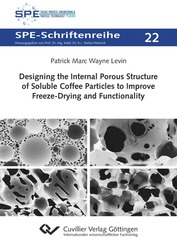| Fachbereiche | |
|---|---|
| Buchreihen (97) |
1381
|
| Nachhaltigkeit |
3
|
| Gesundheitswesen |
1
|
| Geisteswissenschaften |
2370
|
| Naturwissenschaften |
5407
|
| Ingenieurwissenschaften |
1798
|
| Allgemeine Ingenieurwissenschaften | 292 |
| Maschinenbau und Verfahrenstechnik | 863 |
| Elektrotechnik | 690 |
| Bergbau- und Hüttenwesen | 30 |
| Architektur und Bauwesen | 75 |
| Allgemein |
98
|
|
Leitlinien Unfallchirurgie
5. Auflage bestellen |
|
Erweiterte Suche
Designing the Internal Porous Structure of Soluble Coffee Particles to Improve Freeze-Drying and Functionality (Band 22)
Patrick Levin (Autor)Vorschau
Inhaltsverzeichnis, PDF (82 KB)
Leseprobe, PDF (230 KB)
The objective of this work was the understanding of the internal pore structure creation of instant coffee. It includes the question which parameters are influencing the pore structure and mapping the applicable ranges. The influence of these structural parameters on the drying kinetics were investigated in experiment and modeling, finding the optimal approach to increase the drying kinetics. The reconstitution behavior of the dried powder structures was analyzed to link the process optimization to product quality aspects.
The instant coffee was structured in a scraped surface heat exchanger and with different freezing methods, where samples were gassed with nitrogen and carbon dioxide. The amount of gassing, the total solids content, the coolant temperature, the scraping speed, temperature cycling and the freezing rate of the slurry during hardening were shown to influence the morphology of the samples, where total solids content, gassing, temperature cycling and freezing rate showed a dominant influence in the investigated range on structure parameters like open porosity, closed porosity and the median pore diameter, obtained after drying. It could be shown that the pore diameter has the biggest potential to improve drying and reconstitution kinetics.
| ISBN-13 (Printausgabe) | 9783736977266 |
| ISBN-13 (E-Book) | 9783736967267 |
| Buchendformat | other |
| Sprache | Englisch |
| Seitenanzahl | 152 |
| Umschlagkaschierung | matt |
| Auflage | 1. |
| Buchreihe | SPE-Schriftenreihe |
| Band | 22 |
| Erscheinungsort | Göttingen |
| Promotionsort | Hamburg |
| Erscheinungsdatum | 10.01.2023 |
| Allgemeine Einordnung | Dissertation |
| Fachbereiche |
Maschinenbau und Verfahrenstechnik
Allgemeine Verfahrenstechnik |
| Schlagwörter | soluble coffee, porous structure, structure formation, pore size, porosity, gassing, foam, ice crystals, crystalization, scraped surface heat exchanger, freezing rate, temperature cycling, freeze-drying, drying kinetics, modeling, optimization, reconstitution, material properties, löslicher Kaffee, poröse Struktur, Strukturbildung, Porengröße, Porosität, Begasung, Schaum, Eiskristalle, Kristallisation, Schabewärmetauscher, Gefriergeschwindigkeit, Temperaturwechsel, Gefriertrocknung, Trocknungskinetik, Modellierung, Optimierung, Rekonstitution, Materialeigenschaften, Kaffeeaufschlämmung, coffee slurry, Struktur von Lebensmittelpulvern, structure of food powders, Rekonstitution von Pulvern, reconstitution of powders, kritische Mizellenkonzentration, critical micelle concentration, kontinuierlicher Rührkesselreaktor, continuous stirred tank reactor, Differential-Scanning-Kalorimetrie, differential scanning calorimetry, dynamische Dampfsorption, dynamic vapor sorption, Guggenheim, Anderson, de Boer, Hochschermischen, high shear mixing, lichtemittierende Diode, light-emitting diode, LED, relative Luftfeuchtigkeit, relative humidity, Brechungsindex, refractive index, Rasterelektronenmikroskopie, scanning electron microscopy, Gesamtfeststoffgehalt, total solids |
| URL zu externer Homepage | https://www.tuhh.de/spe/home.html |








